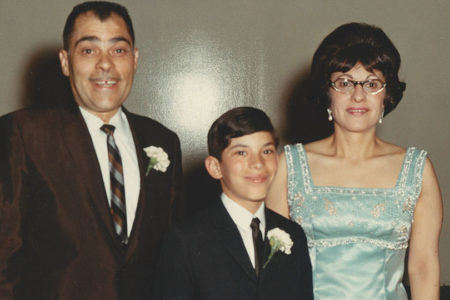Strengthening Your Faith
Board game or boardroom, everyone hates being neutralized. Having our influence or effectiveness nullified by an adversary or circumstance brings disappointment.
Yet that is exactly how the Evil One works in the lives of believers. Neutralizing our faith is the name of his game. The book of Hebrews exhorts us, “Beware, brethren, lest there be in any of you an evil heart of unbelief in departing from the living God” (3:12). It adds, “But without faith it is impossible to please Him, for he who comes to God must believe that He is, and that He is a rewarder of those who diligently seek Him” (11:6).
The book of James is all about a faith that overcomes trials. How do we live by faith and avoid being neutralized? James suggests we do these three things:
1. Minister to the Needy
“What does it profit, my brethren, if someone says he has faith but does not have works? Can faith save him?” (Jas. 2:14). Our evangelical mindset automatically equates the word save with being removed from our spiritually dead, sinful conditions. However, here it is better translated “deliver,” the generic meaning of the Greek verb sozo. Translating it “deliver” forces us to ask, “Deliver from what?” James was saying that faith without works cannot deliver (save) us from the trials of life.
If a brother or sister in Christ needs clothing and food and we merely say, “‘Depart in peace, be warmed and filled,’ but [we] do not give them the things which are needed for the body, what does it profit?” (v. 16). What use are we? If we can fill a need, yet all we do is talk and not help, our faith is dead. Faith without works is useless. It cannot carry us through the trials the Lord sends to mature us.
Perhaps you’re hurting, disappointed, have financial setbacks, or are suffering illness and God brings someone into your life who needs your help. Are you willing to step out in faith and provide what he or she needs, trusting God to help you in your need? Or will you merely say, “Depart in peace”?
If we are learning that God can meet our financial needs, He likely will send us a financial struggle to test our faith (1:3). And with that struggle, He probably also will send someone who needs money. When we help someone else, we demonstrate our trust in God to help us.
This pattern runs throughout the Old Testament. God delivered Israel from slavery in Egypt and led the Israelites to the edge of the Red Sea. He already had demonstrated His power by sending 10 plagues that devastated Egypt. But when the Israelites saw the water before them and the Egyptian army behind them, did they trust the Lord to protect them? No. They complained and failed to demonstrate a living faith.
Yet, an active, living faith is what carries us through hardship, difficulty, pressure, rejection, and disappointment. It delivers us through life’s trials and enables us to see God’s gracious provisions. That is the type of faith God wants to see in us. A living faith may mean giving someone your last $10 because you believe when you need $10, God will provide it.
It is possible to be born again but not exercise a living faith. “Someone will say, ‘You have faith, and I have works.’ Show me faith without your works, and I will show you my faith by my works” (2:18). God wants us to trust Him and live accordingly. Ministering to others when we’re not sure how we will make it ourselves is living by faith, isn’t it? It shifts the focus off ourselves, makes us more like Jesus, and helps us continue to grow spiritually.
2. Manifest a Working Faith
“You believe that there is one God. You do well. Even the demons believe—and tremble!” (v. 19). Demons understand, but they don’t live by what they know. When Jesus ministered on Earth, He met a man possessed by a demon who cried out to the Lord, “Let us alone! What have we to do with You, Jesus of Nazareth? Did You come to destroy us? I know who You are—the Holy One of God!” (Lk. 4:34).
Jesus cast the demon out of the man. The demon demonstrated intellect and mental recognition. He knew exactly who Jesus was, but he possessed no working faith. Demons reject what they know to be true. When we claim to have faith but demonstrate no works, we imitate the demons. We do not live by what we know to be true.
Moses’ mother, Jochebed, demonstrated a working faith when she placed her infant in a basket by the river. She had no idea what God would do but trusted Him to protect Moses. The Lord had Pharaoh’s daughter, of all people, protect the infant and even pay Jochebed to nurse him.
We have no way of knowing what God will do when we respond in faith. Often, God’s Word tells us to do what seems the least logical. Yet, what an encouragement it is when He steps in and works on our behalf.
Our faith pleases Him: “The just shall live by faith; but if anyone draws back, My soul has no pleasure in him” (Heb. 10:38). God wants to be pleased with us the way we want to be pleased with our children.
3. Meditate on God’s Word
To live by faith, we must focus on the examples in Scripture. A good one is Abraham: “Was not Abraham our father justified by works when he offered Isaac his son on the altar?” (Jas. 2:21). Faith worked in conjunction with Abraham’s actions: “‘Abraham believed God, and it was accounted to him for righteousness.’ And he was called the friend of God. You see then that a man is justified by works, and not by faith only” (vv. 23–24).
Many people wrestle with the word justified here because the apostle Paul consistently taught we are justified by grace through faith, “and that not of yourselves; it is the gift of God, not of works, lest anyone should boast” (Eph. 2:8–9). Justification by faith is a foundational doctrine of Scripture.
However, the New Testament uses justification in two ways. When we read saved, salvation, and justify, we automatically think soteriologically. We think about salvation and being born again. But the Greek word for “justify” has other meanings, and here it means “to show to be righteous.” The first definition involves making or declaring someone righteous; the second involves demonstrating someone is righteous.
For example, Jesus asked concerning John the Baptist, “What did you go out into the wilderness to see? A reed shaken by the wind? . . . A man clothed in soft garments? . . . A prophet? Yes, I say to you, and more than a prophet” (Lk. 7:24–26). Scripture says, “When all the people heard Him, even the tax collectors justified God” (v. 29). They did not make God righteous. Rather, they acknowledged God’s existing righteousness.
Faith combined with works shows a believer’s righteousness. Works do not make us righteous; they reveal our righteousness. This is the entire point of the book of James. James wrote, “Count it all joy when you fall into various trials, knowing that the testing of your faith produces patience [endurance]. But let patience have its perfect work, that you may be perfect and complete, lacking nothing” (Jas. 1:2–4).
When we are born again, we are severely lacking—like newborns brought home from the hospital. Newborns can’t do anything for themselves. They must grow and mature. God helps His children grow by taking them through the school of faith.
When Abraham prepared to offer Isaac on the altar, he proved his faith. About 40 years earlier, God took Abraham outside and told him, “Count the stars if you are able to number them. . . . So shall your descendants be” (Gen. 15:5). “He [Abraham] believed in the LORD, and He accounted it to him for righteousness” (v. 6). At that moment, God declared Abraham righteous. This was Abraham’s born-again experience. This is justification—definition number one.
Forty years later, when Abraham bound Isaac on the altar, he was justified by works. He was shown to be righteous. This is justification—definition number two.
Rahab, the Gentile harlot, is another example of faith demonstrated by works. She revealed her faith in the God of Israel when she told the Israelite spies, “I know that the LORD has given you the land” (Josh. 2:9). But she demonstrated her faith when she protected them.
Whether we’re new or mature Christians, God will call on us to trust Him. We won’t escape trials until we die. The important thing is to live by faith in the midst of trials, trust God, and let Him work in our lives. If we minister faithfully to the needy, deliberately manifest our faith daily, and meditate on the biblical examples God has provided, we will avoid being neutralized by the trials of life.







